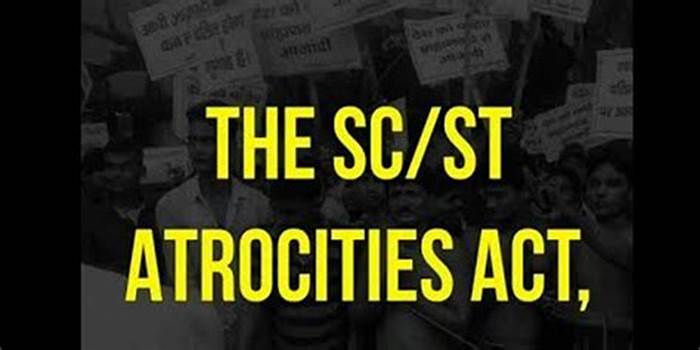Scheduled Castes and Scheduled Tribes (Prevention of Atrocities) Act, 1989

An overview of the SC and ST Act, 1989
Origin
Classifications of mankind have existed since the Vedas. Varna is an ancient division of society derived from the Rigveda that was based on profession (Brahmans, Kshatriyas, Vaishyas, and Shudras). Manusmriti (the book of law) was the primary source of evidence for this claim. It has been shown that the first three groups have parallels with Indo-European societies, and the Shudras are thought to have originated with the Brahmins. The concept of untouchability did not exist in Vedic times. Apparently, this concept appeared in post-Vedic literature, specifically in the Manusmriti, which mentioned the term outcast, as well as the idea that they should be excluded.
From the point of view of a rigid, class-based society, the British, who came from a rigid caste-based society as well, attempted to equate themselves with the Indian caste system. They divided and ruled the country by means of religion, caste, etc. The British acted in a vengeful manner by introducing a separate electorate. It is widely believed that Gandhi-Ambedkar’s Poona Pact (1932) was instrumental in the development of divide and rule in this country, resulting in the deterioration of Dalit conditions. In 1793, Lord Cornwallis introduced the Zamindari System, which was responsible for significant socioeconomic disparities in the society, affecting mostly the lower castes of society.
Due to the failure of the Constitution to create equality for all in Indian society and also to eliminate the practice of untouchability, a new law was needed, and thus, the Untouchability (Offences) Act 1955 was passed, but its shortcomings and loopholes necessitated a complete overhaul of this Act. Upon its revamp in 1976, the Act became the Protection of Civil Rights Act. In spite of the various measures taken by the government to close this gap between lower and upper castes and to protect the Dalits from discrimination, harassment, and offences, they remained a vulnerable category. Even if they had been informed of their rights, they would be intimidated and cowered down by vested interests when they attempt to assert these rights or rebel against the practice of untouchability against them. The then-existing laws, such as the Protection of Civil Rights Act 1955 and the Indian Penal Code, are not sufficient to check the atrocities perpetrated against the Schedule Castes and Schedule Tribes. Therefore, the Parliament, in recognition of the existing problems, passed the Schedule Caste and Schedule Tribes (Prevention of Atrocities) Act of 1989 and its Rules in 1995.
Objectives and purpose of the SC and ST Act, 1989
Scheduled Castes and Scheduled Tribes in the state and union territories are defined in Article 342(1) and Article 366(25) of the Indian Constitution as a special category of tribe or community as and whenever declared by the President. The following are the objectives and the purpose of the Act:
- The Act is the primary legislation aimed at preventing the occurrence of crimes against Scheduled Castes and Scheduled Tribes.
- According to the Act, Special Courts and Exclusive Special Courts shall be established for the purpose of trying individuals charged with such atrocities.
- As per the Act, funds are provided for their free rehabilitation, travel expenses, and maintenance expenses, with officers empowered to ensure that the act is appropriately implemented.
- Additionally, the Act sets out to make the Dalits an integral part of society and to protect their rights when crimes threaten to violate their social, economic, democratic, and political rights.
- The Act works to prevent deprivation and assists marginalized communities in avoiding it.
Implementation of the SC and ST Act, 1989
Section 21 of the said Act states that the government is responsible for ensuring the effectiveness of the Act. For effective implementation, the state government shall take measures in accordance with the Rules. Some of these measures/provisions include:
- Provisions were people subject to atrocities must have access to adequate facilities, including legal aid so that they can seek justice.
- In case of an investigation or trial involving an offence under this Act, provisions shall be made for the payment of travelling and maintenance expenses to witnesses, including victims of atrocities.
- Rehabilitation measures for the victims of atrocities, including economic and social assistance.
- An officer is appointed to initiate prosecutions for violating the provisions of the Act or exercise supervision over those prosecutions.
- The setting up of committees at appropriate levels to assist the state government in formulating or implementing such measures, as deemed appropriate by that government.
- To survey the working of the provisions of this Act periodically so that measures can be suggested for improving their implementation.
- Adoption of measures to ensure the safety of those from Scheduled Castes and Scheduled Tribes who are likely to be subjected to atrocities in specific areas.
- Furthermore, the Central Government shall prepare every year a report pertaining to the measures taken by itself as well as by the state governments in accordance with Section 21 that shall be placed before the lower and upper houses of Parliament.
Process for seeking remedy under the SC and ST Act, 1989
The Scheduled Castes and Scheduled Tribes (Prevention of Atrocities) Rules, 1995 prescribes the following procedure for seeking remedy under the Act:
- An offence can be reported orally or in writing by the victim to the nearest police station. This complaint can also be sent to the relevant police station. via registered mail (Rule 5)
- Anyone below the rank of Deputy Superintendent of Police should be authorized to conduct the spot investigation. Next, the names of the victims are established, as is the extent of the property damage and personal injury. [Rule 6 and Rule 7(1)]
- A report prepared by the investigating officer is sent to the Superintendent of Police, who then forwards it to the Director-General or the Commissioner of Police. Within the next 60 days, the Inspector in Charge of the Police Station responsible for the jurisdiction is instructed to file the charge sheet with the Special Court. [Rule 7(2)]
- In the event that the charge sheet is not filed within 60 days of being formally summoned before the special court, then a reason as to why it has been put off should also be listed as an accompanying statement. [Rule 7(2A)]
Special Courts under the SC and ST Act, 1989
Chapter 4 of the Act contains provisions concerning the constitution of a special court to hear complaints regarding atrocities committed against scheduled castes and tribes. To ensure speedy trials, the State Government must establish in each district a Special Court that will exclusively try the offences under this Act with the concurrence of the Chief Justice of the High Court. Accordingly, in the case of districts that have not had any atrocities against Scheduled Castes or Scheduled Tribes at all, the government shall have the power, with the consent of the National Commission for Scheduled Castes and Scheduled Tribes, either to exempt such district or districts from the provisions of this act or to combine these districts with any neighbouring districts to establish the exclusive special courts.
In conformance with this provision, special courts shall be created that is distinct from existing session courts. These Courts are the only ones authorized to try offences arising under this Act. In addition to that, the act requires the State Government to appoint a Special Public Prosecutor for each Special Court or designate an advocate who has been practising law for at least seven years as a Special Public Prosecutor for the Court that has received the case.

The best law firm in NYC! They explain everything to you and they are very generous and helpful. The lawyers are excellent and very respectful. I highly recommend the Avvocato law firm.